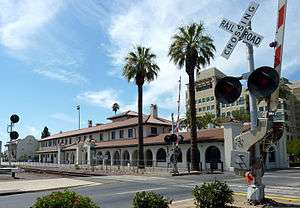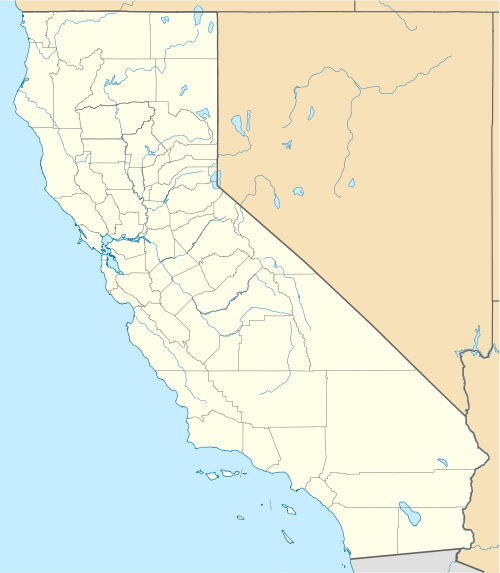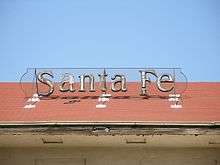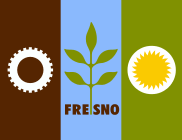Santa Fe Passenger Depot (Fresno)
Fresno | |||||||||||||||||||||||||||||||||||||||||||
|---|---|---|---|---|---|---|---|---|---|---|---|---|---|---|---|---|---|---|---|---|---|---|---|---|---|---|---|---|---|---|---|---|---|---|---|---|---|---|---|---|---|---|---|
| Amtrak inter-city rail station | |||||||||||||||||||||||||||||||||||||||||||
 | |||||||||||||||||||||||||||||||||||||||||||
| Location |
2650 Tulare Street Fresno, California 93721[1] United States | ||||||||||||||||||||||||||||||||||||||||||
| Coordinates | 36°44′18″N 119°46′55″W / 36.73833°N 119.78194°WCoordinates: 36°44′18″N 119°46′55″W / 36.73833°N 119.78194°W | ||||||||||||||||||||||||||||||||||||||||||
| Owned by | City of Fresno | ||||||||||||||||||||||||||||||||||||||||||
| Line(s) | |||||||||||||||||||||||||||||||||||||||||||
| Platforms |
1 side platform 1 island platform | ||||||||||||||||||||||||||||||||||||||||||
| Tracks | 2 | ||||||||||||||||||||||||||||||||||||||||||
| Connections |
Fresno Area Express Amtrak Thruway Motorcoach | ||||||||||||||||||||||||||||||||||||||||||
| Construction | |||||||||||||||||||||||||||||||||||||||||||
| Parking |
11 short term spaces 98 long term spaces[1] | ||||||||||||||||||||||||||||||||||||||||||
| Disabled access | Yes | ||||||||||||||||||||||||||||||||||||||||||
| Other information | |||||||||||||||||||||||||||||||||||||||||||
| Station code | FNO | ||||||||||||||||||||||||||||||||||||||||||
| History | |||||||||||||||||||||||||||||||||||||||||||
| Opened | 1899[2] | ||||||||||||||||||||||||||||||||||||||||||
| Rebuilt | 12 February 2005 | ||||||||||||||||||||||||||||||||||||||||||
| Traffic | |||||||||||||||||||||||||||||||||||||||||||
| Passengers (2015) |
387,640[3] | ||||||||||||||||||||||||||||||||||||||||||
| Services | |||||||||||||||||||||||||||||||||||||||||||
| |||||||||||||||||||||||||||||||||||||||||||
|
Santa Fe Passenger Depot | |||||||||||||||||||||||||||||||||||||||||||
   | |||||||||||||||||||||||||||||||||||||||||||
| Location |
2650 Tulare Street Fresno, California | ||||||||||||||||||||||||||||||||||||||||||
| Coordinates | 36°44′18″N 119°46′55″W / 36.73833°N 119.78194°W | ||||||||||||||||||||||||||||||||||||||||||
| Area | 1.1 acres (0.4 ha) | ||||||||||||||||||||||||||||||||||||||||||
| Built | 1899 | ||||||||||||||||||||||||||||||||||||||||||
| Architect | William Benson Storey, Jr. | ||||||||||||||||||||||||||||||||||||||||||
| Architectural style | Other, California Mission | ||||||||||||||||||||||||||||||||||||||||||
| NRHP Reference # | 76000482[4] | ||||||||||||||||||||||||||||||||||||||||||
| Added to NRHP | 7 November 1976 | ||||||||||||||||||||||||||||||||||||||||||
The Santa Fe Passenger Depot, also known as Fresno station, is a staffed train station in Fresno, California served by Amtrak California's San Joaquin line, which runs six times daily between Oakland or Sacramento and Bakersfield.[Note 1] (The next southbound stop for all trains is in Hanford and the next northbound stop for all trains is in Madera.)
While the station is close to the Yosemite, Kings Canyon and Sequoia National Parks, no public transportation to the parks is offered from this station (an Amtrak Thruway Motorcoach to Yosemite is operated from the Merced station and public transportation to Kings Canyon and Sequoia is available at the Thruway Motorcoach stop in Visalia.)
Description
The station is located at 2650 Tulare Street,[1] just off Santa Fe Street, across the street from the Fresno City Hall. It is situated in the middle of a rough triangle formed by the three freeways in the city (California State Route 99, California State Route 41, and California State Route 198) and is easily accessible from all three.
Of the 78 California stations served by Amtrak, Fresno was the 12th-busiest in FY2013, boarding or detraining an average of approximately 1,094 passengers daily.[6]
Facilities
The station has an indoor waiting room open from 5:30 am to 10:00 pm daily. Inside the station there is a baggage check service, baggage assistance, and an automatic check-in device. In addition to the ticketing agent, there is a Quik-Trak ticket kiosk. There is also a bathroom and payphone. The station has 11 short term and 98 long term parking spaces.[1]
Platforms and tracks
The Santa Fe passenger depot has two tracks, but only one side platform sees regular service. Amtrak trains switch onto this track just north or south of the station, leaving the Main Line clear for freight trains. There is a very narrow island platform between the tracks that is occasionally used when Amtrak trains are not able to switch onto the station track. Passengers are not allowed to wait on the island platform.
| Main Track | ■ Freight line | No regular passenger service |
| Station Track | ■ San Joaquin | toward Oakland or Sacramento (Madera) |
| ■ San Joaquin | toward Bakersfield (Hanford) |
Bus connections
Amtrak California Thruway Motorcoach:
- Route 1B to Los Angeles via Bakersfield (late night/early morning only)
- Route 22 - N West Ave. / East Tulare Ave.
Notable destinations
- Meux Home Museum
- Chukchansi Park
History
.jpg)
The station was built in 1899 for the San Francisco and San Joaquin Valley Railroad (SF&SJV)[7] and was designed by William Benson Storey for the Atchison, Topeka and Santa Fe Railway (ATSF or Santa Fe). It is very similar to the Stockton – San Joaquin Street Station.[8] The station was once the Santa Fe's Valley Division Headquarters, and was expanded or renovated nine times between 1908 and 1985. Sante Fe closed the station for passenger service in 1966 and completely shuttered the building in the early 1990s. When passenger service to Fresno was reinstated on 5 March 1974 Amtrak used a space in the nearby freight house. By the time the city of Fresno purchased the station in 2003, it had fallen into disrepair. The station reopened on 12 February 2005 after a US$6 million renovation project largely restored it to original 1899 appearance.[2] After renovations there are now is 5,400 sq ft (500 m2) dedicated to passenger service and another 12,300 sq ft (1,140 m2) available for lease. The Santa Fe Depot was added to the National Register of Historic Places in 1976.

From its beginning until Amtrak took over nearly all passenger rail service within the United States in 1971, the station was served by ATSF trains, including the famous San Francisco Chief and the Oakland-Barstow line.[9] For the first few years after Amtrak's inception Fresno had no rail service. In 1974 service by Amtrak/Amtrak California's San Joaquin began. Initially, service only included daily service (once in each direction) between Oakland and Bakersfield.[10] Originally, the next northbound stop was Merced, but by 1978 the Storey Train Station was added. (However, under Amtrak that station was known as Madera, rather than Storey.)[11] As the years went by service increased substantially and by 2002 the San Joaquin ran twice daily (in each direction) between Sacramento and Bakersfield and four times daily (in each direction) between Oakland and Bakersfield.[12] In 2010, the Madera (Storey) station was replaced by the new and substantially improved Madera station as the next southbound stop, with the former station having subsequently been entirely removed.
Notes
- ↑ As of 9 June 2014, the San Joaquin southbound trains (Trains 702, 712, 714, 716, 704, and 718) are scheduled to stop at 9:55 am, 11:35 am, 2:10 pm, 5:20 pm, 8:06 pm, and 9:55 pm, respectively. The northbound trains (Trains 711, 701, 713, 715, 717, and 703) are scheduled to stop at 6:50 am, 9:10 am, 12:05 pm, 3:20 pm, 5:45 pm, and 8:18 pm, respectively. The 701-704 trains originate or terminate in Sacramento and the 711-718 trains originate or terminate in Oakland.[5]
References
- 1 2 3 4 "Fresno, CA (FNO)". amtrak.com. Amtrak. Retrieved 6 Jul 2014.
- 1 2 "Great American Stations: Fresno, CA (FNO)". greatamericanstations.com. Amtrak. Retrieved 6 Jul 2014.
- ↑ "Amtrak Fact Sheet, FY2015, State of California" (PDF). Amtrak. November 2015. Retrieved 21 January 2016.
- ↑ National Park Service (2010-07-09). "National Register Information System". National Register of Historic Places. National Park Service.
- ↑ "San Joaquin" (PDF). amtrak.com. Amtrak. 9 Jun 2014. pp. 2–3. Retrieved 5 Jul 2014.
- ↑ "Amtrak Fact Sheet, FY2013, State of California" (PDF). Amtrak. Nov 2013. Retrieved 29 Jun 2014.
- ↑ "Santa Fe Railroad Depot (1899)". historicfresno.org. Retrieved 6 Jul 2014. Adapted from the National Register of Historic Places nomination, originally prepared by Dianne E. Seeger
- ↑ Reiring, Ron (8 Jan 2008). "Fresno, CA. train station". flickr.com. Retrieved 6 Jul 2014.
- ↑ Bowen, Eric H. "The San Francisco Chief". streamlinerschedules.com. Retrieved 5 Jul 2014. Information copied from original Atchison, Topeka and Santa Fe Railway timetable dated 6 June 1954.
- ↑ Amtrak (19 May 1974). "All-American Schedules". timetables.org. The Museum of Railway Timetables. p. 50. Retrieved 6 Jul 2014.
- ↑ Amtrak (8 Jan 1978). "Amtrak National Train Timetables". timetables.org. The Museum of Railway Timetables. p. 46. Retrieved 5 Jul 2014.
- ↑ Amtrak (29 Apr 2002). "National Timetable: Spring Summer 2002". timetables.org. The Museum of Railway Timetables. p. 59. Retrieved 5 Jul 2014.
External links
![]() Media related to Fresno (Amtrak station) at Wikimedia Commons
Media related to Fresno (Amtrak station) at Wikimedia Commons
- Amtrak California - Fresno
- Amtrak - Fresno
- (FNO)--Great American Stations (Amtrak)
- Fresno Amtrak Station (USA RailGuide -- TrainWeb)
